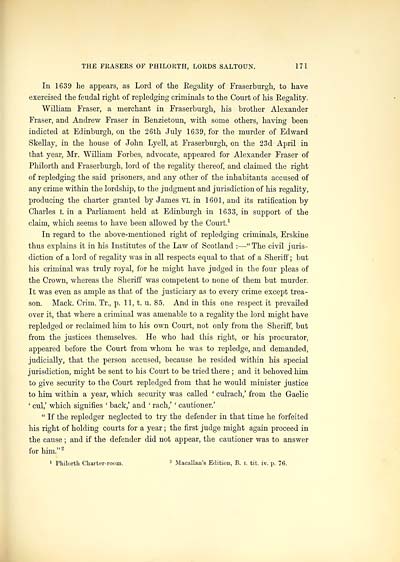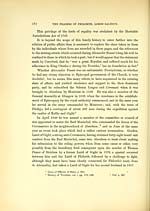Frasers of Philorth > Volume 1
(211)
Download files
Complete book:
Individual page:
Thumbnail gallery: Grid view | List view

THE FKASERS OF PHILORTH, LORDS SALTOTO. 171
In 1639 he appears, as Lord of the Eegality of Fraserburgh, to have
exercised the feudal right of repledging criminals to the Court of his Eegality.
William Fraser, a merchant in Fraserburgh, his brother Alexander
Fraser, and Andrew Fraser in Benzietoun, with some others, having been
indicted at Edinburgh, on the 26th July 1639, for the murder of Edward
Skellay, in the house of John Lyell, at Fraserburgh, on the 23d April in
that year, Mr. William Forbes, advocate, appeared for Alexander Fraser of
Philorth and Fraserburgh, lord of the regality thereof, and claimed the right
of repledging the said prisoners, and any other of the inhabitants accused of
any crime within the lordship, to the judgment and jurisdiction of his regality,
producing the charter granted by James VI. in 1601, and its ratification by
Charles I. in a Parliament held at Edinburgh in 1633, in support of the
claim, which seems to have been allowed by the Court. 1
In regard to the above-mentioned right of repledging criminals, Erskine
thus explains it in his Institutes of the Law of Scotland : — "The civil juris-
diction of a lord of regality was in all respects equal to that of a Sheriff ; but
his criminal was truly royal, for he might have judged in the four pleas of
the Crown, whereas the Sheriff was competent to none of them but murder.
It was even as ample as that of the justiciary as to every crime except trea-
son. Mack. Crim. Tr., p. 11, t. u. 85. And in this one respect it prevailed
over it, that where a criminal was amenable to a regality the lord might have
repledged or reclaimed him to his own Court, not only from the Sheriff, but
from the justices themselves. He who had this right, or his procurator,
appeared before the Court from whom he was to repledge, and demanded,
judicially, that the person accused, because he resided within his special
jurisdiction, might be sent to his Court to be tried there ; and it behoved him
to give security to the Court repledged from that he would minister justice
to him within a year, which security was called ' culrach,' from the Gaelic
' cul,' which signifies ' back,' and ' rach,' ' cautioner.'
" If the repledger neglected to try the defender in that time he forfeited
his right of holding courts for a year ; the first judge might again proceed in
the cause ; and if the defender did not appear, the cautioner was to answer
for him." 2
1 Philorth Charter-room. 2 Macallan's Edition, B. i. tit. iv. p. 76.
In 1639 he appears, as Lord of the Eegality of Fraserburgh, to have
exercised the feudal right of repledging criminals to the Court of his Eegality.
William Fraser, a merchant in Fraserburgh, his brother Alexander
Fraser, and Andrew Fraser in Benzietoun, with some others, having been
indicted at Edinburgh, on the 26th July 1639, for the murder of Edward
Skellay, in the house of John Lyell, at Fraserburgh, on the 23d April in
that year, Mr. William Forbes, advocate, appeared for Alexander Fraser of
Philorth and Fraserburgh, lord of the regality thereof, and claimed the right
of repledging the said prisoners, and any other of the inhabitants accused of
any crime within the lordship, to the judgment and jurisdiction of his regality,
producing the charter granted by James VI. in 1601, and its ratification by
Charles I. in a Parliament held at Edinburgh in 1633, in support of the
claim, which seems to have been allowed by the Court. 1
In regard to the above-mentioned right of repledging criminals, Erskine
thus explains it in his Institutes of the Law of Scotland : — "The civil juris-
diction of a lord of regality was in all respects equal to that of a Sheriff ; but
his criminal was truly royal, for he might have judged in the four pleas of
the Crown, whereas the Sheriff was competent to none of them but murder.
It was even as ample as that of the justiciary as to every crime except trea-
son. Mack. Crim. Tr., p. 11, t. u. 85. And in this one respect it prevailed
over it, that where a criminal was amenable to a regality the lord might have
repledged or reclaimed him to his own Court, not only from the Sheriff, but
from the justices themselves. He who had this right, or his procurator,
appeared before the Court from whom he was to repledge, and demanded,
judicially, that the person accused, because he resided within his special
jurisdiction, might be sent to his Court to be tried there ; and it behoved him
to give security to the Court repledged from that he would minister justice
to him within a year, which security was called ' culrach,' from the Gaelic
' cul,' which signifies ' back,' and ' rach,' ' cautioner.'
" If the repledger neglected to try the defender in that time he forfeited
his right of holding courts for a year ; the first judge might again proceed in
the cause ; and if the defender did not appear, the cautioner was to answer
for him." 2
1 Philorth Charter-room. 2 Macallan's Edition, B. i. tit. iv. p. 76.
Set display mode to:
![]() Universal Viewer |
Universal Viewer | ![]() Mirador |
Large image | Transcription
Mirador |
Large image | Transcription
Images and transcriptions on this page, including medium image downloads, may be used under the Creative Commons Attribution 4.0 International Licence unless otherwise stated. ![]()
| Histories of Scottish families > Frasers of Philorth > Volume 1 > (211) |
|---|
| Permanent URL | https://digital.nls.uk/96568032 |
|---|
| Attribution and copyright: |
|
|---|
| Description | A selection of almost 400 printed items relating to the history of Scottish families, mostly dating from the 19th and early 20th centuries. Includes memoirs, genealogies and clan histories, with a few produced by emigrant families. The earliest family history goes back to AD 916. |
|---|

